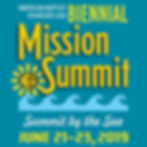
RWF History &
Upcoming Events
Archive of Speeches, Articles & Lectures
Sermons, Resources & More
Roger Williams Fellowship

Fellowship
Baptists need one another. We love our autonomy, yet our interdependence also enriches. The Roger Williams Fellowship continues the vital work of fostering dialogue, honoring dissent and lifting up voices lost too often in the mainstream. This section shows the varied ways we create connections one to another.


THE ROGER WILLIAMS FELLOWSHIP – A PERSONAL JOURNEY
My acquaintance with RWF began at a luncheon meeting in Chicago in the 60s, which established an image of the group as a collection of affable theological liberals committed to progress in the denomination by means of wearying dissent, not so much against tyranny or repression as conventionalism and complacency. The immediate goal was to keep up each other's morale with luncheons, papers, and inspirational talks at Biennial Conventions. The recurring themes (as I perceived them) were theological liberalism amongst ourselves, theological toleration of others, affirming theological toleration as a distinctive feature of Baptist identity, and - in a parallel track – affirming separation of church and state as an expression and guardian of theological toleration.
All this fit well with my Southern Baptist experience of Roger Williams as hero, patron, and prophet, founder of Baptist churches in America. My father lauded religious liberty as the view that "everybody has the right to go to hell in his own way." I think that summarizes it very well.
I attended the RWF luncheon at the 2007 Biennial in Washington DC, but was unfortunately unable to attend a later gathering of the Ohio RWF in Columbus, and I've been in touch from time to time over the years.
The current pseudo-"evangelical" view of religious freedom as freedom to impose religious values on society had not yet been brought into clear focus. But times have changed, public issues have changed, the enemies of free faith are attacking from a different quarter, and RWF seems to have become distracted.
I think we have an important witness to bear, and I'm interested in being part of the exploration of how to do that, although I don't regard myself as a very creative tactician. I would offer, for what it's worth, my observation that we ought to re-focus on the peculiarly Baptist witness to freedom of faith and not become just another open borders component of an amorphous (and therefore anonymous) blob of people who don't like state-imposed religion. There's a difference between us and, say, atheists who don't want religion imposed on them: we are Christians whose religion is expressed by not imposing it on others. We can and must ally with others, but our particular motives – our witness – ought to be distinct. Wherever we are, we need to be aware of why we're there and what in particular we have to offer.
There is benefit in a heavy dose of "inreach" in RWF renewal - my interest was not so much reawakened as "rekindled for the very first time" by reading Roger Williams and the Creation of the American Soul: Church, State, and the Birth of Liberty, by John M. Barry. I wish I had known something more about the man I idolized all those years.
I discovered Roger Williams' understanding of the separation of church from state grew from his long and close experience of the church-state struggles in English common law, and from his Biblical exegesis. Church-state separation was an article of studied faith for him; he understood the first four Commandments as rules for human behavior toward God and the remaining six, separately, as rules for human behavior toward one another, society. The rules for behavior toward God were out of human jurisdiction. In that court, God alone is Judge. It was a matter of religious faith to let God be the judge of human behavior toward God, that was holy territory, and we must not go there.
So the "separation" issue is not a question of limiting the power and activity of the church or state, it is a means of expressing Biblical faith, of not walking unbidden on holy ground.
In Faith,
Glenn Loafmann
Oberlin, OH 10-9-2020
On September 17, 2020, at 4 PM (EST), persons interested in the continuation of the Roger Williams Fellowship participated in a ZOOM based call convened by David Wheeler. The conversation in the chat box for public comment is included at the end of these minutes.
David Wheeler overviewed the recent past of the RWF, which has been primarily without a standing board of officers, but has sustained a regular presence at the ABCUSA Biennials with a meal and keynote speakers. Additionally, a website (recently revised in 2019) is available at www.rogerwilliamsfellowship.com and a Facebook group (“Roger Williams Fellowship”). A standing invitation was made to all to offer content to these two channels.
In the conversation, we identified that the question of “Why” needs to be explored. The mission statement of RWF (as it stands) is in need of revision, particularly in light of changing contexts and concerns. Questions were raised of how RWF bears witness within the ABCUSA family and promotes intersectionality as being part of the ABCUSA, and the reticence among some to live within the diversity and understand the ways religious freedom and Baptist principles are preserved as well as explored. How does this “inreach” relate to an outreach to the larger culture which increasingly interprets “religious liberty” as a rightwing political concern? How are concerns of intersectionality and religious freedom addressed by the racial-ethnic caucuses of ABCUSA and by AWAB, and how might RWF relate to these groups?
We discussed forming a small sub-group (4-5 persons, convened by David Wheeler) for revisiting the mission statement and soliciting comments and perspective from others who know the RWF history and have ideas about what the future purposes of the group might entail.
In terms of events, the biennial in 2021 will be virtual. How can we do something in tandem? Regarding 2023, already there is some interest in partnership with other groups (BPFNA, BJC?). David Wheeler is having a conversation with Dora Garcia of BPFNA on 9-21 about this possibility. Amanda Tyler of BJC had committed to this zoom meeting but was called away at the last minute.
The other question is how to use virtual tools to have additional meetings, opportunities for learning and dialogue, etc. There was some enthusiasm about this possibility.
CHAT RECORD:
From Me to Everyone: 04:40 PM
We have a FB presence. Find us as "Roger Williams Fellowship".
Also a website: www.rogerwilliamsfellowship.com
From Jim Hopkins, Lakeshore Avenue Baptist Church to Everyone: 04:54 PM
Witness is a meaningful word. I would also suggest the word intersection. Where does the tradition of RWF intersect with the many ways God is at work in the world?
From Rick Mixon to Everyone: 04:55 PM
Important question, Jim. Intersectionality is the word of the day.
Or at least one of them.
From Rick Harris to Everyone: 04:56 PM
Agreed to Tim, Jim and Rick!! Intersectionality and witness great words to ponder.
From Richard Myers to Everyone: 04:56 PM
I agree that witness is key. I believe that Paul identified a key piece of our work, a rebuttal of white nationalism. A return to the radical freedom of Williams in an age when people are claiming religious liberty to use their mega churches for partisan purposes, and to use religious liberty to justify discriminatory use of power in their businesses. This is a kairos time.
From Don Ng to Everyone: 04:57 PM
While championing and guaranteeing religious freedom is our prime objective, it’s also important to keep in mind what unites us. What are the common and shared values and beliefs that make us one?
From David Gregg to Everyone: 04:59 PM
I think we need to understand “religious freedom” very broadly. Not just separation of church and state, but also in the other ways RW struggled - freedom from religious authorities, freedom from economic & racial exploitation. What would RW be for / against today?
From Chris Shade to Everyone: 04:59 PM
I'd be happy to help synthesize the input if we open it up.
From Rick Mixon to Everyone: 05:01 PM
An interesting question, David. What would RW stand for today?
From Jim Hopkins, Lakeshore Avenue Baptist Church to Everyone: 05:02 PM
And what would some of those who are standing up today have to say to RW?
From Susan Deer to Everyone: 05:02 PM
Would you send out current mission statement of RWF to each of us- thank you.
The closest thing to a “mission statement” we have at hand -– and it´s really only a descriptor –is this brief paragraph which appears on the website: “The Roger Williams Fellowship (RWF) is a voluntary association of Baptists in the United States dedicated to ´fellowship, freedom and faith´ in honor of Roger Williams.” It´s obvious that this won´t do. We solicit ideas from all about RWF´s mission, and volunteer wordsmiths to weave these ideas into a concise and compelling statement.